
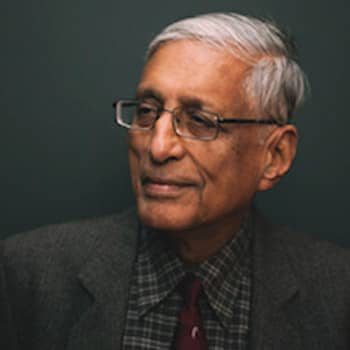
I know Ram Narayanji Chaudhary from my study of history. A sharp observer of individuals and of realities on the Indian soil, Ram Narayanji was also blessed with a sensitive conscience which never allowed him to focus on his own status or comfort. His close relationship with Mahatma Gandhi and Pandit Jawaharlal Nehru could have led to ministerships and governorships. However, Ram Narayanji chose to strengthen not himself but the people of India, whom he served in different ways, including by keeping them well informed through his frank writings, which have helped modern scholars.
Rajmohan Gandhi is the grandchild of Mahatma Gandhi and C Rajagoplachari. He is a renowned biographer of Mahatma Gandhi, Khan Abdul Ghaffar Khan, C. Rajagopalachari, and Vallabhbhai Patel, and currently a research professor at University of Illinois at Urbana-Champaign.
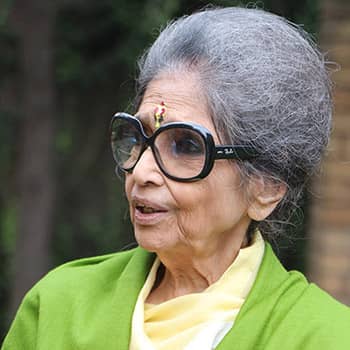
भारत के स्वाधीनता संग्राम की वीरगाथाओं में, और देश के गांधी युग के इतिहास में श्री राम नारायण चौधरी और उनकी पत्नी, श्रीमती अंजना देवी के जीवन का संदेश चिरस्मरणीय है। प्रखर बुद्धि और असाधारण संवेदनशीलता लिए श्री राम नारायण चौधरीजी विशिष्टतम मौलिक चिन्तक थे। गांधी चिन्तन और खादी विचार की सूक्ष्मता और अद्वैत को समझते हुए उन्होने गांधी दर्शन को आत्मसात् किया।
श्री राम नारायण चौधरी और श्रीमती अंजना देवी जी के जीवन का प्रेरणात्मक संदेश हमेशा से अधिक आज और कल के भविष्य के लिए, बहुत महत्वपूर्ण और अति आवश्यक है। उनकी जीवनी को पढ़कर मैं जैसे गांधी युग के आश्रम के सत्संग में चली गई। श्री राम नारायण चौधरी और उनकी पत्नी, श्रीमती अंजना देवी जी की स्मृति को नमन करते हुए और उनको श्रद्धांजलि देते हुए मैं स्वयं को सम्मानित महसूस कर रही हूँ।
Tara Gandhi Bhattacharjee is the grandchild of Mahatma Gandhi and C Rajagopalchari. She is Chairperson, National Gandhi Museum (New Delhi) and Trustee, Kasturba Gandhi National Memorial Trust.
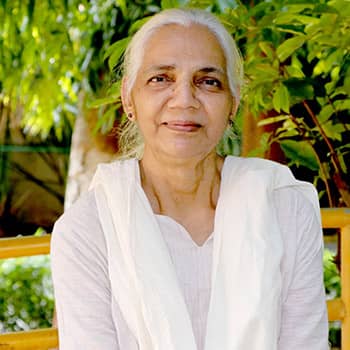
A hundred years ago, a young Ramnarayan, a man of great merit, passion, and a revolutionary fervour, made a choice of a lifetime: to follow M.K. Gandhi and his non-violent way. Forsaking lures of a settled career, and easy fascination of a violent way, he plunged himself into the hard work of service in the cause of so-called ‘untouchables’, goseva, Khadi and such other constructive programmes. His immediate mentor was Jamnalal Bajaj, and his theatre of action was the then region of Rajputana. In the course of this service, varied roles vested in him over the years and he did justice to them with full commitment. He had spells of stay in close proximity of Gandhiji at his Ashrams, Sabarmati and Sewagram, with his family. In all this, he had the ideal support of Smt. Anjana Devi, his sahadharmacharini in the true sense. After Independence, he dedicated his time and energy to writing, translating, editing, publishing books — a huge list of them with high standards of quality. Through them, we have an authentic peep into the world of those rarest of rare times. Making the choice of such a valiant life, a life of service, sacrifice and self-suffering, and sustaining it with unwavering faith over a whole life-time required courage of conviction and conduct. It was indeed a herculean feat in itself with the added charm of living in the mystic aura of Gandhiji.
Dina Patel, a committed archivist, is the Director of Collected Works of Mahatma Gandhi Cell at Gujarat Vidyapith (Ahmedabad).
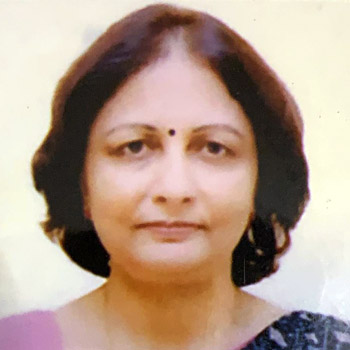
Ram Narayanji, my Nana, was a bit of magic for me. His stature never allowed us to take too many liberties. We held him duly in some awe. In my growing up years, senior politicians would come to meet Nanaji and seek his advice and blessings. I used to ask him: “Why did you not take up any role in government?” He would unhesitatingly respond: “I will never accept any position of power and profit.” A true Gandhian, sacrifice was everything for him and he even gave up palatial family properties in his youth to live a life of simplicity. We always knew that such renunciation would not have been possible without the active consent of my Nani, Shrimati Anjana Chaudhary, who was Nanaji’s perfect partner, if not ahead of him. Nanaji could speak without fear and speak always the truth to those in power precisely because of his detachment from material possessions. He never flaunted his stature within the family and carried out his day to day activities all by himself even when he was in his nineties. I wonder how small we are, compared to Nanaji and Nani.
Sadhana Rout is former Principal Director General of Publications Division, Ministry of Information & Broadcasting, Government of India.
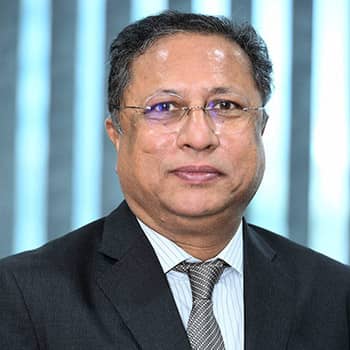
Growing up with Nanaji, Ram Narayan Chaudhary, meant growing up with the tales of freedom fighters ranging from Bhagat Singh and Vijay Singh Pathik to Gandhiji. He instilled in me a sense of justice through his social work, especially for Dalits in those formative years. Due to his influence, caste and religion did not mean anything in our house. He ensured what was unthinkable or unacceptable in those days: our cook was a Muslim and our house-help would invariably be a Dalit. In fact, when my school friends discriminated against Dalits or spoke about them in a demeaning fashion, I felt strange and hurt. This important lesson of treating all humans as equal beings opened my mind. Indeed, our family’s cosmopolitanism comes from Nanaji’s principled vision of equality.
Arvind Agrawal is currently the CEO of Jumbo Group (Dubai). He has over three decades of experience as a business person in the technology sector.
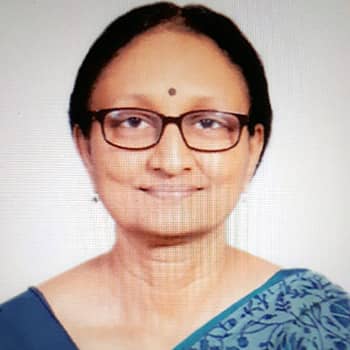
My first memories of Ram Narayanji, my Nana, go back to the early 1960s: I can clearly see him showing every new leaf and bud in the garden to a 3-year-old, filling her with a sense of amazement! At that early age, he inculcated in me a habit of physical activity and a sense for caring. He would dictate pages of his translation work to me whereby I learnt to not misplace even a nukhta (dot in Devnagri and Perso-Arabic script). Nanaji maintained an elaborate accounting system for house expenses which in my childhood I thought was a bizarre obsession. Only after I grew up, I graciously understood the significance of having learnt accounting at that young age and its benefits in my personal and professional life. Most importantly, Nanaji taught me the virtue of civility and respect for everyone regardless of the individual’s wealth, occupation, or education.
Pragya Nopany is a science educator and founder-coordinator of BVN-IAPT Anveshika (New Delhi), a space for teachers and students to learn physics through experimentation.
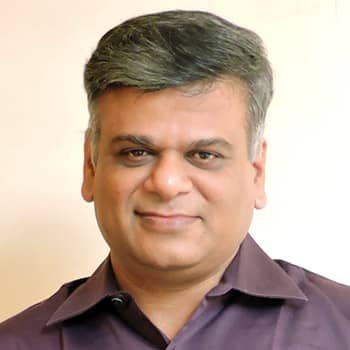
Ram Narayanji’s contribution to the nationalist struggle and his writings deserve in-depth evaluation. As early as 1917, Mahatma Gandhi found Ram Narayanji ‘worthy of being taken up’ as he wrote in a letter to Jamanalal Bajaj. But it took over a decade before Choudharyji became a full-fledged Gandhian and stayed at Sabarmati Ashram in Ahmedabad as well as Sevagram Ashram at Wardha and went to jail multiple times. Leaders of great stature put their trust in Ram Narayanji, for example, after Independence, Pandit Nehru opened up with him in a series of interviews sharing rare insights about both political matters, especially relating to the freedom movement and personal issues.
Urvish Kothari is a journalist-writer, Gandhi scholar, publisher, and satirist from Gujarat.